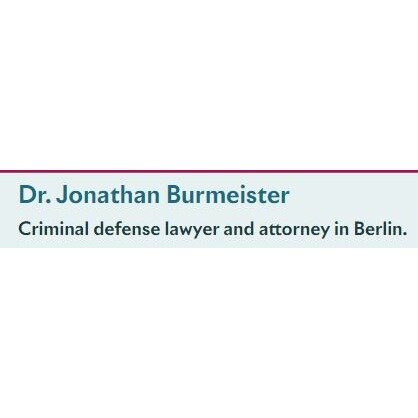Best Immigration Lawyers in Germany
Share your needs with us, get contacted by law firms.
Free. Takes 2 min.
Or refine your search by selecting a city:
List of the best lawyers in Germany
About Immigration Law in Germany
Immigration law in Germany is a well-structured system designed to regulate the entry and residence of foreigners in the country. Over the years, Germany has transformed into a multicultural society, largely due to its progressive immigration policies. The law governs various aspects, including visas, residency permits, work permits, asylum, and citizenship. The legal framework is aimed at balancing the country's economic needs, demographic challenges, and humanitarian responsibilities.
Why You May Need a Lawyer
Navigating through Germany’s complex immigration system can be overwhelming, especially for someone unfamiliar with the legal procedures and language. Here are common situations where legal assistance may be beneficial:
- Applying for a residence permit or a visa extension and need assistance with documentation.
- Facing deportation or recently received a deportation notice.
- Seeking asylum and need representation in legal proceedings.
- Applying for German citizenship and navigating through the legal requirements.
- Experiencing difficulties with family reunification applications.
- Encountering employment-related immigration issues, such as work permits.
Local Laws Overview
Germany has comprehensive immigration laws that include several key aspects:
- Residence Permits: Different types of residence permits are available based on the duration and purpose of stay, including study, work, or family reunion.
- Asylum Seekers: The Asylum Act (AsylG) outlines the process and the rights of those seeking protection in Germany.
- Blue Card Program: Designed to attract highly skilled professionals from non-EU countries.
- Naturalization: The process for becoming a German citizen after fulfilling certain residency and integration requirements.
- Family Reunification: Laws facilitating family members to join residents in Germany under specific conditions.
Frequently Asked Questions
Do I need a visa to enter Germany?
It depends on your nationality and the purpose of your visit. EU/EEA citizens do not need a visa, while non-EU citizens may require a visa depending on the duration and purpose of their stay.
What is a residence permit and how can I apply for one?
A residence permit allows non-EU citizens to stay in Germany for a specified period. You can apply for it at the local Foreigners' Office (Ausländerbehörde) with the necessary documentation.
What are the eligibility criteria for the EU Blue Card?
The EU Blue Card is for highly skilled professionals with a university degree and a job offer with a minimum salary threshold in Germany.
How can I apply for German citizenship?
You can apply for naturalization after usually eight years of legally residing in Germany, demonstrating language proficiency and integration.
How can I appeal a visa refusal?
If your visa has been refused, you can submit an appeal (Remonstration) to the German embassy or consulate that issued the decision, usually within a month.
What are my rights as an asylum seeker in Germany?
Asylum seekers have specific rights concerning legal assistance, accommodation, and allowances while their application is being processed.
Can I bring my family to Germany?
Family reunification is possible under certain conditions, such as adequate living space, income, and health insurance coverage for the family members.
How do I extend my stay in Germany?
Extension of stay requires applying for a visa extension or a different type of residence permit before your current permit expires at the local Foreigners' Office.
What happens if my application for a residence permit is rejected?
If rejected, you will receive the reason in writing and have the right to appeal the decision within a specified time frame.
What is the Integration Course and who needs to take it?
An Integration Course is designed to help immigrants learn German and integrate into society, typically required for those seeking long-term residency or naturalization.
Additional Resources
Several resources and organizations can provide valuable assistance:
- Federal Office for Migration and Refugees (BAMF): Offers a wealth of information and support services related to immigration.
- Local Foreigners' Authorities (Ausländerbehörde): Directly handle residence permits and visa applications.
- German Red Cross: Provides assistance to refugees and asylum seekers.
- Pro Asyl: Advocates for refugees' rights and protection in Germany.
- Caritas: Offers support services including legal advice and integration help for immigrants.
Next Steps
If you believe you need legal assistance regarding immigration in Germany, consider taking the following steps:
- Gather all relevant documentation related to your immigration status.
- Research and reach out to a qualified immigration lawyer experienced in German immigration law.
- Contact local support organizations for additional guidance and resources.
- Schedule a consultation to discuss your situation with a legal expert.
- Follow the legal advice provided and keep regular contact with your legal advisor to monitor progress.
Lawzana helps you find the best lawyers and law firms in Germany through a curated and pre-screened list of qualified legal professionals. Our platform offers rankings and detailed profiles of attorneys and law firms, allowing you to compare based on practice areas, including Immigration, experience, and client feedback.
Each profile includes a description of the firm's areas of practice, client reviews, team members and partners, year of establishment, spoken languages, office locations, contact information, social media presence, and any published articles or resources. Most firms on our platform speak English and are experienced in both local and international legal matters.
Get a quote from top-rated law firms in Germany — quickly, securely, and without unnecessary hassle.
Disclaimer:
The information provided on this page is for general informational purposes only and does not constitute legal advice. While we strive to ensure the accuracy and relevance of the content, legal information may change over time, and interpretations of the law can vary. You should always consult with a qualified legal professional for advice specific to your situation.
We disclaim all liability for actions taken or not taken based on the content of this page. If you believe any information is incorrect or outdated, please contact us, and we will review and update it where appropriate.
Browse immigration law firms by service in Germany
Germany Attorneys in related practice areas.
Browse immigration law firms by city in Germany
Refine your search by selecting a city.















